
John Randolph Webb was an American actor, television producer, director, and screenwriter, most famous for his role as Joe Friday in the Dragnet franchise, which he created. He was also the founder of his own production company, Mark VII Limited.
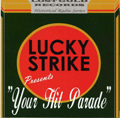
Your Hit Parade was an American radio and television music program that was broadcast from 1935 to 1953 on radio, and seen from 1950 to 1959 on television. It was sponsored by American Tobacco's Lucky Strike cigarettes. During its 24-year run, the show had 19 orchestra leaders and 52 singers or groups. Many fans inaccurately referred to the show as The Hit Parade.

Sylvester Laflin "Pat" Weaver Jr. was an American broadcasting executive who was president of NBC between 1953 and 1955. He has been credited with reshaping commercial broadcasting's format and philosophy as radio gave way to television as America's dominant home entertainment. His daughter is actress Sigourney Weaver.
The Gillette Cavalcade of Sports is an American radio-turned-television program by the National Broadcasting Company (NBC) that ran from 1942 to 1960. The program included broadcasts of a variety of sports, although it is primarily remembered for its focus on boxing matches.

The Virginian was an American Western television series starring James Drury in the title role, along with Doug McClure, Lee J. Cobb, and others. It originally aired on NBC from 1962 to 1971, for a total of 249 episodes. Drury had played the same role in 1958 in an unsuccessful pilot that became an episode of the NBC summer series Decision. Filmed in color, The Virginian became television's first 90-minute Western series. Cobb left the series after four seasons, and was replaced over the years by mature character actors John Dehner, Charles Bickford, John McIntire, and Stewart Granger, all portraying different characters. It was set before Wyoming became a state in 1890, as mentioned several times as Wyoming Territory, although other references set it later, around 1898.

Ma Perkins is an American radio soap opera that was heard on NBC from 1933 to 1949 and on CBS from 1942 to 1960. It was also broadcast in Canada, and Radio Luxembourg carried it in Europe.
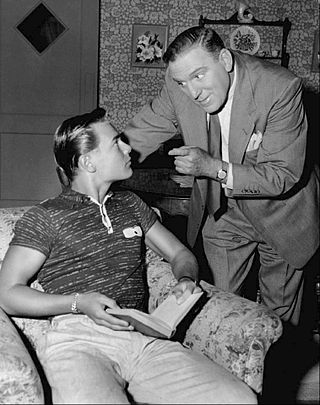
The Life of Riley is an American radio situation comedy series of the 1940s that was adapted into a 1949 feature film, as well as two different television series, and a comic book.

WCAU is a television station in Philadelphia, Pennsylvania, United States, serving as the market's NBC outlet. It is owned and operated by the network's NBC Owned Television Stations division alongside Mount Laurel, New Jersey–licensed Telemundo outlet WWSI ; it is also sister to regional sports network NBC Sports Philadelphia.
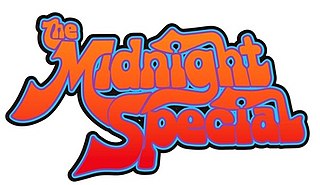
The Midnight Special is an American late-night musical variety series originally broadcast on NBC during the 1970s and early 1980s, created and produced by Burt Sugarman. It premiered as a TV special on August 19, 1972, and then began its run as a regular series from February 3, 1973 to March 27, 1981. The 90-minute program aired on Saturday mornings at 1 a.m. ET/PT after the Friday night edition of The Tonight Show Starring Johnny Carson.

Michele Tafoya is a freelance reporter and retired sports broadcaster and advisor. She hosts the podcast Sideline Sanity. From 2011 to 2022, she was a reporter for NBC Sports, primarily as a sideline reporter for NBC Sunday Night Football. She currently works as a conservative political advisor and makes television appearances on talk shows discussing the state of American politics and culture.
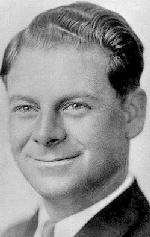
Albert Pearce was an American comedian, singer and banjo player who was a popular personality on several radio networks from 1928 to 1947.

Admiral Broadway Revue is an American live television variety show that ran from January 28 to June 3, 1949. The show was notable for being "television's first full scale Broadway type musical revue."
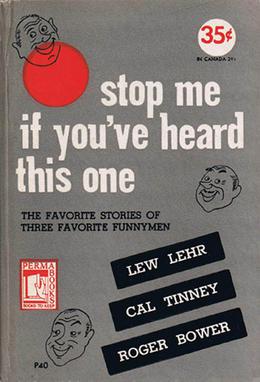
Stop Me If You've Heard This One was a comedy radio series, created by the actor-humorist Cal Tinney and sponsored by Quaker Oats. Hosted by Milton Berle, it aired Saturday evenings at 8:30pm on NBC beginning October 7, 1939.
The following is the 1950–51 network television schedule for the four major English language commercial broadcast networks in the United States. The schedule covers primetime hours from September 1950 through March 1951. The schedule is followed by a list per network of returning series, new series, and series cancelled after the 1949–50 season. This season became the first in which primetime was entirely covered by the networks. It was also the inaugural season of the Nielsen rating system. Late in the season, the coast-to-coast link was in service.
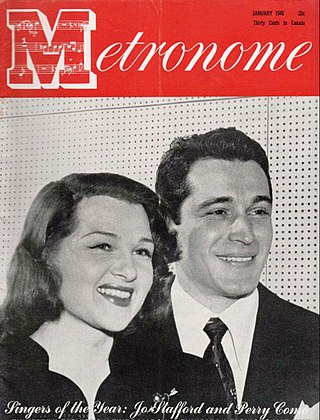
The Chesterfield Supper Club is an NBC Radio musical variety program (1944–1950), which was also telecast by NBC Television (1948–1950).
Ford Theatre, spelled Ford Theater for the original radio version and known, in full, as The Ford Television Theatre for the TV version, is a radio and television anthology series broadcast in the United States in the 1940s and 1950s. At various times the television series appeared on all three major television networks, while the radio version was broadcast on two separate networks and on two separate coasts. Ford Theatre was named for its sponsor, the Ford Motor Company, which had an earlier success with its concert music series, The Ford Sunday Evening Hour (1934–42).
Aunt Mary is a radio soap opera in the United States. Episodes were 15 minutes long, running Monday through Friday. The show began with regional broadcasts on the West Coast, but it eventually was distributed more widely.
Four Star Revue was an American variety/comedy program that aired on NBC from October 4, 1950, to December 26, 1953.
The Fred Allen Show is a long-running American radio comedy program starring comedian Fred Allen and his wife Portland Hoffa. Over the course of the program's 17-year run, it was sponsored by Linit Bath Soaps, Hellmann's, Ipana, Sal Hepatica, Texaco and Tenderleaf Tea. The program ended in 1949 under the sponsorship of the Ford Motor Company.
The Pepsodent Show is an American radio comedy program broadcast during the Golden Age of Radio. The program starred comedian Bob Hope and his sidekick Jerry Colonna along with Blanche Stewart and Elvia Allman as high-society crazies Brenda and Cobina as well as a continuously rotating supporting cast and musicians which included, for a time, Judy Garland, Frances Langford and Desi Arnaz and his orchestra.













